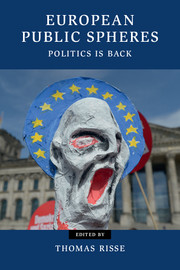Book contents
- Frontmatter
- Contents
- List of figures
- List of tables
- List of contributors
- Preface
- 1 Introduction
- Part I How to grasp the Europeanization of public spheres: theory, methods, empirics
- 2 Theorizing communication flows within a European public sphere
- 3 How advanced is the Europeanization of public spheres? Comparing German and European structures of political communication
- 4 National media as transnational discourse arenas: the case of humanitarian military interventions
- 5 European issue publics online: the cases of climate change and fair trade
- Part II Consequences: does the Europeanization of public spheres matter?
- Part III Theoretical and normative implications
- Bibliography
- Index
4 - National media as transnational discourse arenas: the case of humanitarian military interventions
Published online by Cambridge University Press: 05 November 2014
- Frontmatter
- Contents
- List of figures
- List of tables
- List of contributors
- Preface
- 1 Introduction
- Part I How to grasp the Europeanization of public spheres: theory, methods, empirics
- 2 Theorizing communication flows within a European public sphere
- 3 How advanced is the Europeanization of public spheres? Comparing German and European structures of political communication
- 4 National media as transnational discourse arenas: the case of humanitarian military interventions
- 5 European issue publics online: the cases of climate change and fair trade
- Part II Consequences: does the Europeanization of public spheres matter?
- Part III Theoretical and normative implications
- Bibliography
- Index
Summary
The often aggressive tone prevalent in public debates on the current European sovereign-debt crisis is seen by many observers as evidence of the long predicted impossibility of democratic governance beyond the nation-state, the lack of a European demos, and the lack of a resilient European identity. In this chapter, I argue that transnational political communication in the European Union (EU) is well developed and that we can clearly observe a gradient in comparison to non-EU countries such as the United States. In the national media, people find information and competing interpretations that enable them to form their opinions on the important issues concerning the shared economic, legal, and political space of the EU. Moreover, the various publics are not simply speaking past one another, in that they do share common themes, but they occasionally have conflicting opinions rooted in different interests and sometimes different values. Although in cases such as the European sovereign-debt crisis, the opposing camps seem to coincide with countries or groups of countries, the picture is more complicated because also within countries, the important issues are highly controversial. The European sovereign-debt crisis is an excellent example of an intense and highly politicized transnational debate.
This chapter proceeds as follows.
- Type
- Chapter
- Information
- European Public SpheresPolitics Is Back, pp. 84 - 107Publisher: Cambridge University PressPrint publication year: 2014
- 6
- Cited by



